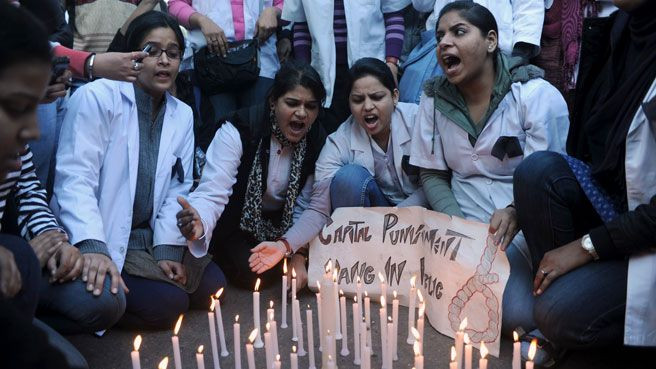Delhi Gang-Rape: Fifth Man Arrested, Police Seek Life Imprisonment

Protests over the horrific gang-rape of a young woman last weekend in Delhi continue unabated across India, with tens of thousands of women, students, activists and others venting their rage against politicians, police officials, the court system, as well as Indian culture’s marginalization of females.
Swati, a student who protested outside Rashtrapati Bhavan, the official residence of the President of India, told Times of India: "They do nothing to protect us, and when we want justice, they say we need permission to enter the president's house. Such a heinous crime has occurred, and they expect us to seek permission to protest.”
Even a group of Muslim clerics in Mumbai called for comprehensive changes in Indian society.
In a statement, they declared: "The Delhi gang-rape is a horrifying and spine-chilling incident. The crime of rape can be stemmed only through change in the present capitalistic, patriarchal social system which influences the minds of young people very severely. Only widespread condemnation and anger does not solve the crime against women.”
Delhi police have arrested a fifth man identified as Raju in connection with the crime, which occurred last Sunday when a 23-year-old medical student, travelling with a male companion, was sexually assaulted by at least four men. She and her friend were subsequently beaten, tortured and tossed off naked onto the street.
Press Trust of India reported that the government and police will seek life imprisonment – the maximum allowable punishment – for the accused, upon conviction.
“With the evidence gathered so far -- circumstantial, forensic and others -- we are confident that we will be able to convict the accused,” said Union Home Secretary R.K. Singh.
Singh also promised tighter security and greater police presence on public transport, where many rapes occur.
In response to demands from the public that rapists be handed the death penalty, Singh said: “We will have to look into the demand...but there are many jurists, various human rights groups which are demanding abolition of capital punishment in India, though I personally believe that there should be death penalty for such [a] crime.”
The woman victim is now fighting for her life suffering from grave injuries in Safdarjung, a Delhi hospital. She remains in critical condition.
TOI reported that the victim underwent surgery to remove a gangrenous portion of her intestine, and that she risks infection.
However, doctors at Safdarjung are asking that protesters surrounding the hospital leave.
“We have an appeal to people. Please free hospital from protests. It should not serve as an obstacle for others, movement of ambulance and supply line vehicles. [A] peaceful atmosphere should be maintained at the hospital premises,” Dr B. D. Athani, medical superintendent of Safdarjung, told a press conference.
“Parents [of the victim] are also in fact requesting...We are requesting all of you to not to engage them in conversation because ever since they are with the patient...they have been asked to, forced to talk.”
Athani also said the ban on visitors would apply to celebrities and politicians.
Meanwhile, a committee of India’s parliament will meet with senior Delhi lawmakers and police officials on December 27 to discuss the current environment for women’s safety and what steps can be taken to remedy this crisis in the breakdown of law and order.
© Copyright IBTimes 2024. All rights reserved.




















